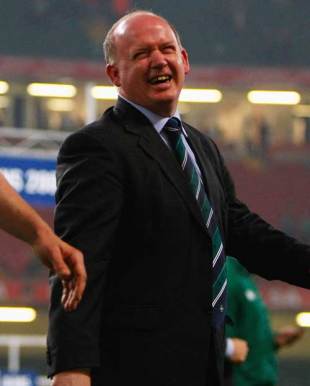|
Irish Rugby
The most progressive team in Ireland
Hugh Farrelly
September 15, 2009

Declan Kidney has set his sights on Rugby World Cup 2011
© Getty Images
Enlarge
Next Sunday, Cork and Kerry will battle for the All-Ireland Senior Football title in front of an 82,000 full house in Croke Park. It's a big deal in Ireland, where Gaelic games are the national sport, but the problem for the Gaelic Athletic Association (GAA) is that no-one outside the country, save for committed expatriates, gives a fig. The International Rules series, involving a hybrid brand of football played between Ireland and Australian Rules football players, is popular with the combatants but has never captured the public's imagination. The parochialism that is the GAA's greatest strength (every village in Ireland has a local team) is also its Achilles heel for, with no viable international outlet, the Association is vulnerable to other sports. Furthermore, a strict adherence to its amateur code means talented youngsters can be lured away from the game they grew up with (Shane Horgan, Geordan Murphy and Rob Kearney were all talented underage footballers capable of graduating to the senior teams of their respective counties) by the prospect of pay for play...enter rugby. Rugby is on an unprecedented high in Ireland. Munster have been joined by Leinster at Europe's top table and the national side have finally received tangible reward for long-acknowledged potential. The result is Irish rugby entering this season as Grand Slam, Six Nations, Triple Crown, Churchill Cup, Heineken Cup and Magners League champions. A tough act to follow but, while repeat success in those competitions is desirable, Ireland coach Declan Kidney's thoughts are now trained on a tournament Ireland have never performed in. In six attempts, Ireland's best World Cup performance remains their 1991 quarter-final defeat to eventual champions Australia when a jammed Lansdowne Road backboned a committed, if unlikely, Irish display. There were tame quarter-final exits in 1987, 1995 and 2003 while the 1999 and 2007 tournaments have acquired a Basil Fawlty-esque 'don't mention the war' quality. Thus, there is no shortage of incentive for Ireland and Kidney to reach the last four, at least, in 2011. The plans are in place. Last week, Andrew Trimble and Paddy Wallace were pulled from Ulster's squad for their Magners League clash away to the Ospreys under the "RWC 2011 Player Management Programme". This slipped somewhat under the radar, in that there was no official policy announcement from the IRFU, although it was known there was a desire for Ireland's elite to be subjected to national control. It will prove unpopular with provincial coaches, understandably anxious to safeguard their own patches (as Kidney was when he was coaching Munster), but this is a sensible development, even from two years out. While rugby's explosion in popularity means there is talent coming through in greater numbers that at any time in living memory, Ireland are still expected to base their World Cup challenge around their multi-capped 'Triple-O' totems of Brian O'Driscoll, Ronan O'Gara and Paul O'Connell. O'Gara will be 34 in 2011, O'Driscoll and O'Connell 32. The Munster second-row and Lions captain is in least need of protection as second-rows frequently hit their peak in their early 30s (Martin Johnson was 33 when England won in 2003) but O'Driscoll's bravery has taken a predictable toll on his body and O'Gara wears a target for opposition forwards every time he takes to the pitch. Then there is the remarkable John Hayes, still untouchable on the right-hand side of the Munster and Ireland scrum. The Cappamore farmer will be pushing 38 in two years' time but like O'Gara, O'Driscoll and flanker David Wallace (who will be 35), you suspect these players have targeted a successful World Cup as the perfect way to vacate the international stage. Kidney is working closely with the provinces (in contrast to his predecessor) and, in a further break from Eddie O'Sullivan's regime, we are also likely to see some 'bigger picture' selections in November and in the Six Nations. The likes of Leinster prop Cian Healy, out-half Jonathan Sexton and Munster outside back Keith Earls can expect to be brought on as Kidney aims to match depth to experience for 2011. These are heady days for Irish rugby. The Republic of Ireland are pushing hard for qualification for the World Cup but could barely draw 10,000 to Thomond Park for a recent international with South Africa. A few days later, Munster had almost twice that for an early season Magners League match. Cork and Kerry in Croke Park will be a compelling spectacle on Sunday for what will be true celebration of Irishness. However, more than the All-Ireland final or soccer World Cup play-off likely to be hosted there in a few weeks, it is when the national rugby side takes to that hallowed turf that we will witness the most progressive team in Irish sport. The goal is Rugby World Cup 2011 and the work has begun. © Scrum.com
|
Live Sports
Communication error please reload the page.
-
Football
-
Cricket
-
Rugby
-
- Days
- Hrs
- Mins
- Secs
F1 - Abu Dhabi GP
Abu Dhabi Grand Prix December 11-131. Max Verstappen ()
2. Valtteri Bottas (Mercedes)
3. Lewis Hamilton (Mercedes)
4. Alexander Albon ()
5. Lando Norris ()
6. Carlos Sainz Jr ()
-
ESPNOtherLive >>
Darts - Premier League
Golf - Houston Open
Snooker - China Open
Tennis - Miami Open

